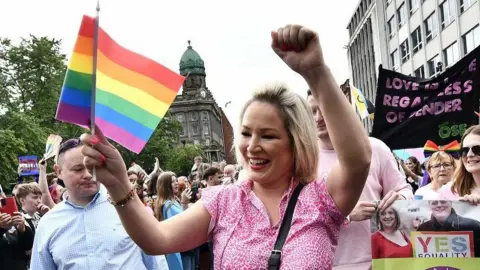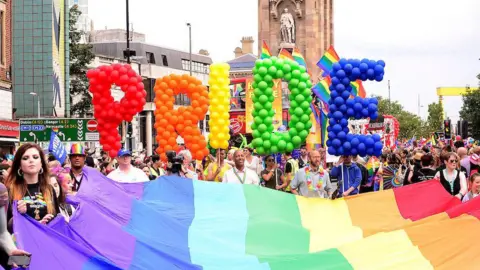BBC News NI
 Pacemaker
PacemakerFirst Minister Michelle O’Neill has expressed sadness that her party is not permitted to march in Belfast Pride this year.
The Sinn Féin vice president said she would still celebrate Pride “in my own way”.
Stormont’s four executive parties, Sinn Féin, DUP, Alliance and UUP, were told by Pride organisers that they were not welcome at the parade because they supported a ban on puberty blockers for under-18s.
Stormont’s Agriculture Minister Andrew Muir, who is gay, has said he will be taking part in Belfast Pride in a “personal capacity”.
Thousands of marchers and spectators are expected in Belfast city centre for the Pride parade on Saturday.
“I’ve always been an advocate for equality and human rights, so it does make me sad that they have taken the decision that they have taken,” the first minister told the BBC.
The majority of Pride parades across Northern Ireland have taken a similar decision and asked the executive parties not to attend.
A message from Pride organisers in the official guide to the event says the theme for this year is “no going back”.
“Around the world and here at home LGBTQIA+ rights are being questioned, challenged and rolled back. In the face of that, we are standing tall and speaking up.
“Pride is power, Pride is protest, Pride is community, we cannot afford to be complacent, we will not go backwards.”
BBC News NI reported earlier this week that the head of the Northern Ireland Civil Service (NICS) was warned it would be “open to the charge of acting politically” by taking part in Belfast Pride.
Jayne Brady was told by a senior adviser there would be “criticism for any decision the NICS takes”, according to internal emails.
But O’Neill added it was “the right approach” for the NICS to participate in the event.
“The civil service is the one of the largest employers that we have here – over 24,000 staff,” she said.
“We are an inclusive employer, and I think it’s absolutely appropriate that the head of that service should be there and walk in the celebration that is Pride on Saturday.
“We can’t promote inclusivity and employ that many people and not actually turn up on the day of celebration.”
The Alliance politician also defended the NICS continuing to take part in Belfast Pride.
“I think that is really, really good and I want to commend the leadership of the Northern Ireland Civil Service,” he added.
Muir said there has been “an awful lot of nonsense frankly that’s been talked around Pride”.
“And I think there’s an agenda from some people to push back the rights of LGBTQIA+ people in Northern Ireland, and I’m not going to be part of that,” he added.
 Pacemaker
PacemakerAn organiser of Belfast Pride confirmed that Pride organisers met representatives from Sinn Féin and Alliance to seek their support to lift the ban on puberty blockers.
“They weren’t changing their views, they weren’t going to push for the bans being removed,” she said.
The organiser added that the remaining executive parties “didn’t want to meet”.
She said Pride “has always been a protest” and remains so during the current controversy over transgender health services.
Lynn Millar, interim co-chair of Belfast Pride festival, said that the rights of the transgender community were “under threat” as a result of the ban.
Speaking to the BBC’s Good Morning Ulster programme, she defended the decision to exclude executive parties from taking part in the march.
“We’re acting on what our trans community wanted us to do,” Ms Millar said.
“Pride has always been a protest. It started out as riots – we’re not going back to that.
“We celebrate Pride as well, but there will always be a political element when it comes to human rights and I’m not going to apologise for that.”
She said that transgender healthcare was contributing to mental health problems among young people.
“They’re being told: ‘You’re not getting what you need, just live with it’,” she said.
Ms Millar rejected the idea that banning political parties from Belfast Pride was the wrong approach for LGBT activists who are seeking social change.
She said: “Next year is our 35th Pride parade. We have struggled and fought so hard to get things to change. We still do.
“I would love some day for Pride to be purely a celebration.
“While any members of our community – any group within our community – are being treated unfairly, it will always be a protest.”
In recent years, the participation of some organisations in Northern Ireland Pride events has been seen as controversial.
Officers from the Police Service of Northern Ireland (PSNI) first paraded in uniform at the Belfast Pride event in 2017.
But in 2023, they were instructed not to wear police uniforms if attending Pride.
At that time, the PSNI said the decision was taken to comply with its obligations on impartiality.
In the same year, Belfast’s Pride organisers banned Ulster Rugby from their march because of its ban on transgender women playing in female contact rugby games.
The Irish Rugby Football Union (IRFU) said it was disappointed but respected their decision.




